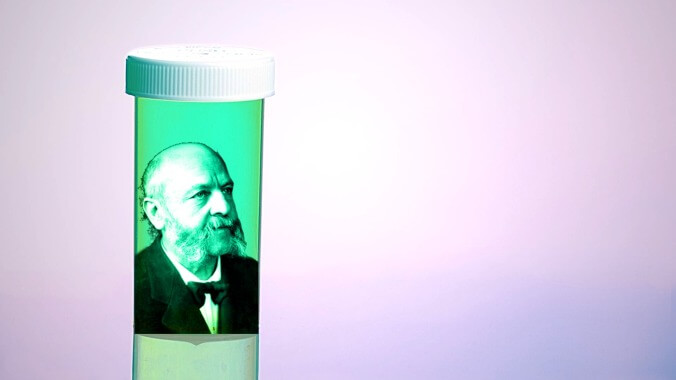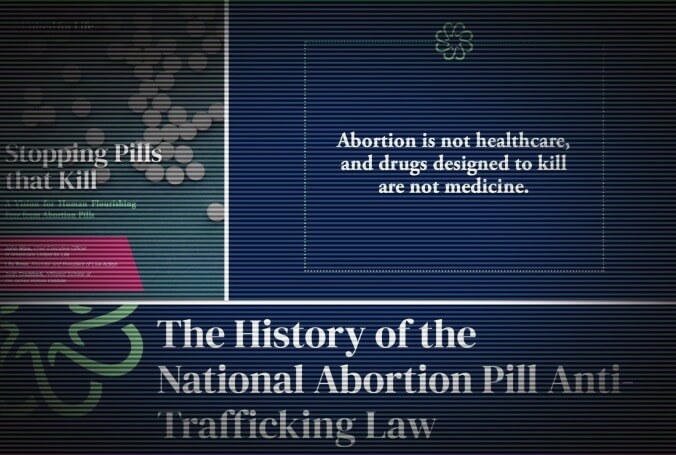Inside the ‘Diabolical’ Campaign to Ban Abortion Pills by Rebranding the Comstock Act
Conservative groups have launched a PR campaign to frame the Comstock Act of 1873 as an anti-drug trafficking law. One expert compared it to the Nixon administration’s manufactured War on Drugs.
Photo: iStockphoto/Getty Images AbortionIn DepthPolitics
Amid the chaos of Donald Trump’s second term in office so far, there has been something of an eerie quiet regarding abortion access in the U.S. That’s not to say Trump hasn’t done anything. He has: His administration greenlit violence at abortion clinics by saying it will limit enforcement of a 30-year-old federal law, and pardoned people convicted of blockading clinics under that law. The Pentagon also ended a policy of reimbursing travel costs for service members and their dependents who get abortions out of state.
But after years of conservative groups proclaiming that abortion pills are the biggest threat to their goal of banning all abortion nationwide, it feels like we’re waiting for the other shoe to drop. While we wait, it appears abortion opponents are working to make it easier to get the public on board by conflating the mailing of abortion pills with trafficking illicit drugs. After all, most people oppose drug trafficking.
The Comstock Act of 1873 is at the center of their plans, as Jezebel has been reporting since December 2022, but resurrecting a 19th-century anti-obscenity law is going to be a hard sell. For starters, how do you convince Americans that they should support a dormant law championed 150 years ago by a dude obsessed with other people’s sex lives?
That’s the challenge conservatives face as they’ve pushed to enforce the law via a high-profile lawsuit and the Project 2025 playbook. Both argue that Comstock could ban sending abortion drugs, mifepristone and misoprostol, by mail. That would either end telemedicine prescriptions or, if read broadly, end deliveries of mifepristone to clinics. It would apply nationwide, not just in states that have banned abortion, and first-time offenders face up to five years in prison. So far, we haven’t heard a peep about Comstock, but then again, Trump’s cabinet is still getting settled. Attorney General Pam Bondi and Health and Human Services Secretary Robert F. Kennedy, Jr., were confirmed on February 5 and February 13, respectively.
Still, it seems likely that some attempt to enforce Comstock is coming, either via federal courts or from Trump’s own administration. Meanwhile, anti-abortion advocates may have landed on a strategy to try to sell this radical proposal to the public: invoking the War on Drugs.
How do you convince Americans that they should support a dormant law championed 150 years ago by a dude obsessed with other people’s sex lives?
On what would have been the 52nd anniversary of the Roe v. Wade decision, two prominent anti-abortion groups, Americans United For Life and Live Action, released a policy paper that refers to Comstock as a “federal abortion pill anti-trafficking law.” A coalition of 30 activists also sent a letter urging Trump’s Department of Justice to rescind the Biden administration stance on Comstock and enforce the law by investigating people mailing abortion pills; the letter similarly claimed it was an anti-trafficking statute.
“I think [calling it anti-trafficking is] absolutely about shaping public opinion,” said Lauren MacIvor Thompson, an assistant professor of history and interdisciplinary studies at Kennesaw State. “If ordinary Americans today understood the broader history of the Comstock Act in terms of its passage and then enforcement, I think they would say ‘this is kind of ridiculous.’”
Live Action first used this language in a March 2024 press release about the mifepristone lawsuit, and a co-author of the policy paper, Josh Craddock, told NPR in April 2024 that he calls Comstock a “national abortion pill trafficking ban.” The use of the word “trafficking” invokes ideas about cartels and can serve to “criminalize and pathologize” the healthcare providers and others helping women get abortion pills, said Karen Thompson, legal director at Pregnancy Justice, an organization that fights against the criminalization of pregnancy outcomes, including miscarriage, stillbirth, and abortion. She predicts this is how the right will attempt to legitimize abortion criminalization: “They’re going to try to turn to turn healthcare providers into the heads of drug cartels.”
“It’s a little bit diabolical.”
-

-

-

-

-

-

-

-

-

-

-

-

-

-

-

-

-

-

-

-

-

-

-

-

-

-

-

-

-

-

-

-

-

-

-

-

-

-

-

-









































